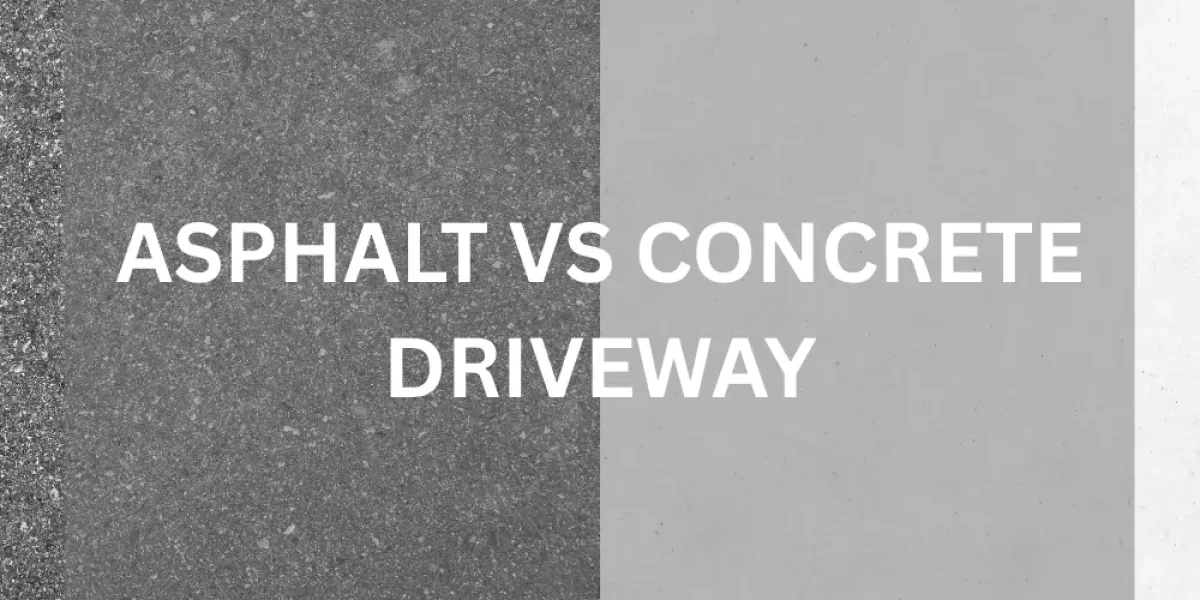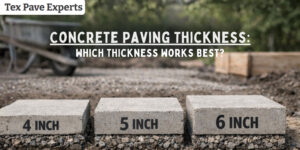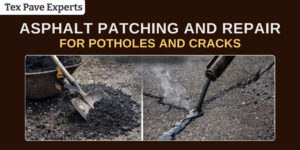Trying to pick between asphalt and concrete for your driveway? It mostly depends on how much you want to spend, the weather where you live, and what style you like.
Asphalt is the dark, smooth, road-like surface. It’s cheaper and handles cold weather well, but it needs to be sealed every few years to stay in good shape. Concrete is the lighter grey surface, like sidewalks. It costs more upfront, but it lasts longer and doesn’t need as much maintenance. You can also make concrete look more decorative if you want.
There isn’t one perfect choice for everyone. What’s best for you depends on your needs, your budget, and your local climate.
What’s the Difference Between Asphalt and Concrete Driveways?
If you’re picking a driveway, you’ll probably hear about two main choices: asphalt and concrete. Both are good, but they aren’t the same.
- Asphalt: This is the black surface you see on most roads. It’s made from rocks, sand, and a sticky black oil. It’s cheaper and quicker to put in, usually done in a day or two. Asphalt is flexible, so it handles cold weather better. But it needs sealing every few years and wears out faster, lasting around 15 to 25 years.
- Concrete: This is the light grey surface you see on sidewalks. It’s made from cement, water, sand, and gravel. Concrete is strong and lasts longer-30 to 40 years or more. It can also be colored or designed to look fancy. It costs more and takes longer to install. In cold places, it can crack if not made right.
Simple Comparison:
- Cost: Asphalt is cheaper at first; concrete saves money over time.
- Lifespan: Asphalt lasts 15-25 years; concrete 30-40+ years.
- Care: Asphalt needs more upkeep; concrete is harder to fix.
- Weather: Asphalt is better for cold; concrete is better for heat.
- Looks: Asphalt is plain; concrete has design options.
Asphalt vs Concrete Quick Comparison Table
| Feature | Asphalt Driveway | Concrete Driveway |
| Material | Bitumen (sticky oil) mixed with sand and gravel | Cement, water, sand, and gravel |
| Cost (Initial) | Lower upfront cost | Higher upfront cost |
| Cost (Lifetime) | More maintenance may lead to higher total cost | Less maintenance can lead to lower total cost |
| Lifespan | 15–25 years with proper care | 30–40+ years with minimal upkeep |
| Maintenance | Needs sealing every 2–3 years; easy to patch | Rare sealing; harder to repair cracks and stains |
| Durability | Flexible; good in freeze-thaw climates, but softens in extreme heat | Strong and stable; handles heavy loads well, may crack in freeze-thaw |
| Installation Time | 1–2 days; ready to use quickly | 3–7 days; needs time to cure properly |
| Climate Suitability | Great for cold regions due to flexibility | Better in hot climates, needs protection in icy or salted areas |
| Aesthetics | Classic black finish; limited design | Can be colored, stamped, or textured for custom looks |
| Surface Feel | Smooth, slightly soft underfoot | Hard and rigid feel |
| Environmental Impact | Recyclable sometimes made with recycled materials | Also recyclable but more energy-intensive to produce |
| Repairability | Easy to resurface or patch | Repairs are more visible and tricky to match |
| Best For | Quick install, lower budget, colder climates | Long-term value, hot climates, custom design appeal |
Pros and Cons of Asphalt Driveways
- Pros of Asphalt Driveways:
- Lower Upfront Cost – Asphalt is usually 30-50% cheaper than concrete per square foot. It’s a budget-friendly option if you’re looking to save on installation.
- Quick Installation – Most asphalt driveways can be installed in 1-2 days and are ready for use within 24-48 hours. That means less disruption to your daily routine.
- Cold Climate Friendly – Because it’s flexible, asphalt can expand and contract with freeze-thaw cycles, which helps prevent early cracking in colder regions.
- Easy & Affordable Repairs – Small cracks and holes are easy to patch. You can even resurface the entire driveway for a fresh look without replacing it all.
- Smooth and Safe Surface – The uniform texture is great for driving, walking, or biking. Its dark colour also helps melt snow faster in winter.
- Recyclable Material – Old asphalt can be reused, which is a plus for eco-conscious homeowners.
- Cons of Asphalt Driveways:
- Needs Regular Maintenance – Asphalt must be sealed every 2–3 years to protect it from water, UV rays, and oil spills. Skipping this can lead to faster wear.
- Shorter Lifespan – Even with good care, asphalt usually lasts 15–25 years, less than concrete.
- Heat Sensitivity – In very hot weather, asphalt can soften. This makes it vulnerable to dents from parked vehicles or sharp objects.
- Fading & Stains – Over time, UV rays fade the rich black colour to a dull grey. Oil, gas, and chemicals can also leave stains.
- Limited Design Options – Asphalt has a basic look. Unlike concrete, it doesn’t offer much variety in colour or texture.
- Environmental Impact – While recyclable, asphalt is petroleum-based and its production involves heat, which contributes to carbon emissions.
Pros and Cons of Concrete Driveways
- Pros:
- Lasts a Long Time – Concrete driveways can stay strong for 30 to 40 years if you take care of them.
- Easy to Care For – You don’t need to seal them often. Just cleaning now and then usually does the trick.
- Good for Hot Weather – Concrete doesn’t get soft or sticky in the heat.
- Custom Looks – You can make it look cooler with colours or patterns.
- Super Strong – Great for big trucks or heavy loads without damage.
- Cons:
- Costs More – It’s more expensive to install than asphalt.
- Takes Time to Dry – You have to wait a few days before driving on it.
- Can Crack – If the ground moves or it gets really cold, cracks can show up.
- Gets Stained – Things like oil or salt can leave marks that are hard to clean.
- Hard to Fix – Repairs can be pricey and don’t always look perfect.
Why Choose Texpave Experts for Asphalt or Concrete Driveways in Texas?
Texas weather can be rough on driveways. That’s why picking the right team to build yours is super important. Texpave Experts has been building strong driveways across Texas for over 35 years.
- Ready for Texas Weather: Texpave knows how hot summers and cold snaps can damage driveways. They use the right materials to stop cracks and keep your driveway strong.
- Skilled in Both Asphalt and Concrete: They don’t just do one thing. Whether you want asphalt or concrete, they’ll help you pick what’s best for your home and your budget.
- Built to Last: Texpave makes sure the ground under your driveway is strong. They use top-quality materials that work well in Texas and make your driveway last a long time.
- Easy to Work With: They keep things simple. You get a free quote, clear updates, and a team that shows up on time and explains everything.
- Warranties for Peace of Mind: If something goes wrong, you’re covered. Their warranties protect the materials and the work.
If you want a driveway that’s built right and made to last, Texpave is the team to call.


